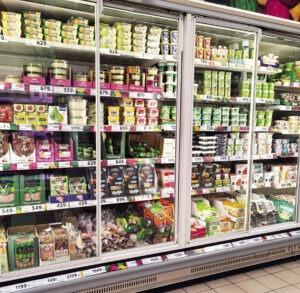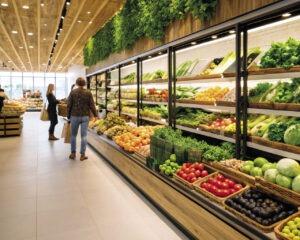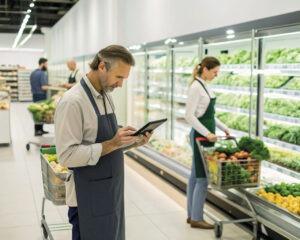Conscious consumers, digital transformation: lessons learned on the FMCG market in 2024
This article is available for reading in Trade magazin 2025/6-7.
In 2024 the FMCG sector showed modest growth for the second consecutive year, according to Euromonitor International’s “The World Market for Retail” study, indicating that sales grew by 1% in dollar terms (calculated without the effects of inflation). Because of the economic uncertainty consumers continue to try to curb their spending, and the winners of this trend are discounters. Once again the world’s biggest retailers increased their market share last year, putting smaller players in an increasingly difficult position. According to Euromonitor International, the size of the global FMCG market was USD 8,108bn in 2024. McKinsey&Company claims 2024 was a period of stabilisation for the European FMCG sector, with food retail sales growing by 2.4%.

2024 brought a period of stabilisation for grocery retail in Europe
In more channels at the same time
Since it is becoming increasingly natural for shoppers to combine the options offered by online and physical stores, omnichannel shopping has once again strengthened its positions in 2024. According to Shopify, 86% of FMCG spending already comes from multichannel consumers and one in five shoppers buys online and offline simultaneously. Consequently, retailers have invested heavily in ensuring a seamless shopping experience: click-and-collect services, easy-to-use loyalty programmes and flexible return policies are all designed to make shopping easier. Whole Foods Market, Tesco and Costco are reacting to new consumer expectations with a wide range of multi-channel solutions, from automated logistics to in-app purchase management. NIQ data reveals that private label products accounted for nearly 8% of the global sales growth last year and 53% of shoppers said they were buying more private label products than before.

Food retailing is increasingly moving beyond treating private labels as a cheap alternative and is focusing on innovation in premium, health-conscious, sustainable and convenience segments
AI: efficiency and personalisation
According to Progressive Grocer’s “2024 Tech Trends” report, 66% of FMCG retailers plan to invest in technology this year, while BCG reports that 43% of shoppers are excited to see how these developments will improve the shopping experience. One of the biggest contributions of technology to retail trade is hyper-personalisation and personalised experiences through the analysis of customer data. McKinsey believes this could increase sales revenue by as much as 5-15%, reduce customer acquisition costs by 50% and account for 40% of sales by fast-growing companies. In 2024 retail media gained ground in FMCG retail all over the world. In Europe retail media has become one of the fastest-growing sources of revenue: according to an IAB Europe forecast, the market represented a value of EUR 14bn in 2024 and is expected to grow to EUR 31bn by 2028. However, the fragmented market structure of the continent makes it difficult for advertisers to reach consumers effectively, so the introduction of standardised measurement systems is indispensable for further development.

Grocery retailers plan technological investments to improve the shopping experience
Related news
A developing digital employee who works independently – AI has taken the next level
🎧 Hallgasd a cikket: Lejátszás Szünet Folytatás Leállítás Nyelv: Auto…
Read more >Hungarian world first: AI calculator calculates how much a company will lose during the flu season and how much can be saved by using preventive technologies
🎧 Hallgasd a cikket: Lejátszás Szünet Folytatás Leállítás Nyelv: Auto…
Read more >Related news
Innovations, success stories and awards on the same stage
🎧 Hallgasd a cikket: Lejátszás Szünet Folytatás Leállítás Nyelv: Auto…
Read more >Farewell day at the 60th anniversary EuroShop trade fair
🎧 Hallgasd a cikket: Lejátszás Szünet Folytatás Leállítás Nyelv: Auto…
Read more >NAV: Women’s Day inspections begin
🎧 Hallgasd a cikket: Lejátszás Szünet Folytatás Leállítás Nyelv: Auto…
Read more >







